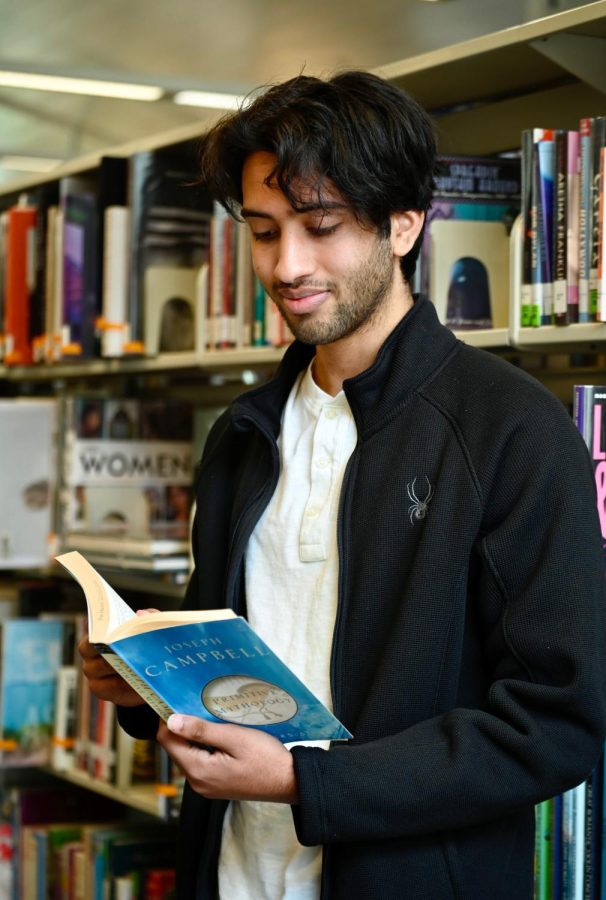Humans of Harker: Philosophical parallels, scientific studies
Vishnu Veeravalli thrives in the complementing studies of philosophy and science
“Oftentimes when you interact with a professor or teacher at Harker, it’s a very professional relationship, but through this process, I got to know these very accomplished people as just people. It’s great to make interpersonal connections with such amazing people that I never thought I’d get the opportunity to speak to,” Vishnu Veeravalli (’23) said.
Vishnu Veeravalli (’23) meticulously reflects on a philosophical treatise brimming with annotations before returning focus to his digital research paper, expressing his perception and findings for eventual publication. His fascination with both philosophy and STEM strengthens with each successive work as he draws parallels between the two.
Vishnu initially became attracted to philosophy in tenth grade, when he discovered a documentary series on Youtube called “Philosophy in Motion.” He was instantly fascinated with the channel and soon became involved with it after contacting the program’s manager. The aim of the series is to make Eastern classics, especially those of China, more accessible to the general public by sharing relevant and captivating stories from the Daoist classic Zhuangzi. After engaging further in the studies of the series, Vishnu now not only presides as the lead video editor, but also assists the team with research work.
“Both research and philosophy are very inaccessible, so through this series, I hope to do as much work as possible to acquaint myself with the nuances of both to become accustomed to it enough to educate others about my [discoveries],” Vishnu said.
Vishnu has found that mastering the principles of science is essential to fully comprehend philosophical notions. When reading science-related works, he explores the philosophical implications, and when studying philosophical works, he considers the science that contradicts or reinforces the piece.
“The split between philosophy and science is slightly fictitious,” Vishnu said. “For example, the scientific method was invented by philosophers, so you need a strong grasp on both in order to really make progress in new frontiers of knowledge.”
Close friend Rahul Herrero (’23), who has grown closer to Vishnu this year, acknowledges his affinity and commitment to his philosophical work.
“I’ve noticed that when he starts to really like something, he invests all his time into it,” Rahul said. “I’ve seen this [pattern] with philosophy where he brings books about it to read at school and goes very in depth with the studies.”
He explores STEM-related works through Socratic Studios, a Youtube channel that he co-founded in tenth grade with another high school student to discuss topics such as physics, computer science and biology.
His tenacity for teaching originated in a research class where he was tasked with analyzing papers that he struggled to comprehend. He often found himself reaching out to the papers’ authors to discuss them, acknowledging through the process that the insight he gleaned would be valuable to others as well.
Vishnu fulfills his ambition to educate others by hosting lecture series and interviews with STEM experts on his channel. The process begins with reading captivating research papers and subsequently contacting the author and inviting them for an online discussion.
Upper school teacher Chris Spenner worked extensively with Vishnu throughout high school in both Research Methods and Advanced Research. He commended Vishnu’s flexibility when presented with topics he isn’t familiar with, while determining which ones arouse his curiosity and attention the most.
“Since sophomore year, he’s learned a lot about his interests,” Spencer said. Because of that bubbling of ideas, he is able to quickly jump from one topic to another to see what fits. As he’s taken more science classes, new fields of research have opened to him, so he’s done a great job with exploring whatever is at the cutting edge of what he has learned.”
Along with a multitude of topics he has learned about after creating the channel, Vishnu also cherishes the opportunity to speak with people that he never thought he would talk with at such a young age. He virtually interacts with Ivy League professors as well as professionals from across the world daily and appreciates the relationships he develops with them.
“Oftentimes when you interact with a professor or teacher at Harker, it’s a very professional relationship, but through podcasting, I got to know these very accomplished people as just people,” Vishnu said. “It’s great to make interpersonal connections with such amazing people that I never thought I’d get the opportunity to speak to.”
Upper school physics teacher Lisa Radice, who taught Vishnu in junior year, noted his genuine enthusiasm for learning and perpetual curiosity, allowing for growth of a broader base of knowledge.
“He truly has a genuine interest in learning and is willing to put in the time and effort,” Radice said. “He’s very thoughtful [in the sense that] he doesn’t just care about the answer, but wants to understand why that was the answer.”
However, Vishnu encountered a multitude of challenges with his studies in philosophy and STEM due to the inaccessibility of its research. To grow acclimated to them, he first had to acquaint himself with the intricacies of both subjects, a lengthy and arduous process.
While familiarizing himself with the two, he discovered that the best approach was to learn by educating and making information accessible. He is constantly seeking to learn more, devoting the majority of his spare time to expand his knowledge. This mentality progressively develops his sense of empathy for others with similar goals, and he therefore strives to share his findings in an easily digestible manner.
“I hope to become more empathetic in the future, which I think is the main skill you need to learn in order to teach anyone,” Vishnu said. “Being empathetic allows you to present information in a way that’s digestible and makes the most sense.”
Motivated to strengthen his teaching abilities, he began to study psychology. He was initially interested in solely the science behind it, but subsequently discovered that a profound component of philosophy exists behind the science. He was successful in this study by enrolling in a course of Philosophy of the Mind, an introduction to philosophical issues concerning the nature of consciousness and its relationship to the body and by taking lessons from an Oxford researcher who guided him through the process.
By exploring the connections between these subjects, Vishnu has extended his knowledge and mindset exponentially, especially by developing uplifting relationships with others in the same fields. Everyone he meets possesses their own set of beliefs and perspectives, and engaging with those people on a daily basis serves as guidance for his pursuits.
“Learning about both philosophy and science has broadened my horizons because I’m constantly interacting with people who are more knowledgeable than me,” Vishnu said. “Just by speaking to them, I’m learning more than I ever have in a classroom setting just by having those casual conversations.”

Aryana Bharali (12) is a Managing editor for Humans of Harker, and this is her fourth year on staff. This year, she looks forward to sharing the stories...

Alena Suleiman (12) is the co-editor-in-chief of Harker Aquila, and this is her fourth year on staff. Alena wishes to interact with new people and work...


















![“[Building nerf blasters] became this outlet of creativity for me that hasn't been matched by anything else. The process [of] making a build complete to your desire is such a painstakingly difficult process, but I've had to learn from [the skills needed from] soldering to proper painting. There's so many different options for everything, if you think about it, it exists. The best part is [that] if it doesn't exist, you can build it yourself," Ishaan Parate said.](https://harkeraquila.com/wp-content/uploads/2022/08/DSC_8149-900x604.jpg)




![“When I came into high school, I was ready to be a follower. But DECA was a game changer for me. It helped me overcome my fear of public speaking, and it's played such a major role in who I've become today. To be able to successfully lead a chapter of 150 students, an officer team and be one of the upperclassmen I once really admired is something I'm [really] proud of,” Anvitha Tummala ('21) said.](https://harkeraquila.com/wp-content/uploads/2021/07/Screen-Shot-2021-07-25-at-9.50.05-AM-900x594.png)







![“I think getting up in the morning and having a sense of purpose [is exciting]. I think without a certain amount of drive, life is kind of obsolete and mundane, and I think having that every single day is what makes each day unique and kind of makes life exciting,” Neymika Jain (12) said.](https://harkeraquila.com/wp-content/uploads/2017/06/Screen-Shot-2017-06-03-at-4.54.16-PM.png)








![“My slogan is ‘slow feet, don’t eat, and I’m hungry.’ You need to run fast to get where you are–you aren't going to get those championships if you aren't fast,” Angel Cervantes (12) said. “I want to do well in school on my tests and in track and win championships for my team. I live by that, [and] I can do that anywhere: in the classroom or on the field.”](https://harkeraquila.com/wp-content/uploads/2018/06/DSC5146-900x601.jpg)
![“[Volleyball has] taught me how to fall correctly, and another thing it taught is that you don’t have to be the best at something to be good at it. If you just hit the ball in a smart way, then it still scores points and you’re good at it. You could be a background player and still make a much bigger impact on the team than you would think,” Anya Gert (’20) said.](https://harkeraquila.com/wp-content/uploads/2020/06/AnnaGert_JinTuan_HoHPhotoEdited-600x900.jpeg)

![“I'm not nearly there yet, but [my confidence has] definitely been getting better since I was pretty shy and timid coming into Harker my freshman year. I know that there's a lot of people that are really confident in what they do, and I really admire them. Everyone's so driven and that has really pushed me to kind of try to find my own place in high school and be more confident,” Alyssa Huang (’20) said.](https://harkeraquila.com/wp-content/uploads/2020/06/AlyssaHuang_EmilyChen_HoHPhoto-900x749.jpeg)



